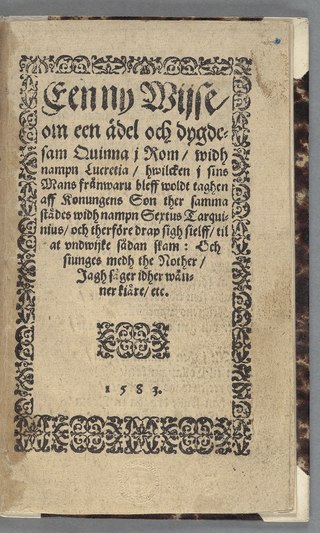
Ribaldry or blue comedy is humorous entertainment that ranges from bordering on indelicacy to indecency. Blue comedy is also referred to as "bawdiness" or being "bawdy".
"Tom o' Bedlam" is the title of an anonymous poem in the "mad song" genre, written in the voice of a homeless "Bedlamite". The poem was probably composed at the beginning of the 17th century. In How to Read and Why Harold Bloom called it "the greatest anonymous lyric in the [English] language."

Thomas d'Urfey was an English writer and wit. He wrote plays, songs, jokes, and poems. He was an important innovator and contributor in the evolution of the ballad opera.
Edward Potts McCurdy was an American folk singer, songwriter, and television actor. His most well-known song was the anti-war "Last Night I Had the Strangest Dream", written in 1950.
The year 1706 in music involved some significant events.
Henry Playford was an English music publisher, the younger son and only known surviving child of John Playford, with whom he entered business.
"A Guy Is a Guy" is a popular song written by Oscar Brand. It was published in 1952.

A broadside is a single sheet of inexpensive paper printed on one side, often with a ballad, rhyme, news and sometimes with woodcut illustrations. They were one of the most common forms of printed material between the sixteenth and nineteenth centuries, particularly in Britain, Ireland and North America because they are easy to produce and are often associated with one of the most important forms of traditional music from these countries, the ballad.
"Old MacDonald Had a Farm" is a traditional children's song and nursery rhyme about a farmer and the various animals he keeps. Each verse of the song changes the name of the animal and its respective noise. For example, if the verse uses a cow as the animal, then "moo" would be used as the animal's sound. In many versions, the song is cumulative, with the animal sounds from all the earlier verses added to each subsequent verse.
Thomas Gordon was a Scottish writer and Commonwealthman. Along with John Trenchard, he published The Independent Whig, which was a weekly periodical. From 1720 to 1723, Trenchard and Gordon wrote a series of 144 essays entitled Cato's Letters, condemning corruption and lack of morality within the British political system and warning against tyranny. The essays were published as Essays on Liberty, Civil and Religious, at first in the London Journal and then in the British Journal. These essays became a cornerstone of the Commonwealth man tradition and were influential in shaping the ideas of the Country Party. His ideas played an important role in shaping republicanism in Britain and especially in the American colonies leading up to the American Revolution. Zuckert argues, "The writers who, more than any others, put together the new synthesis that is the new republicanism were John Trenchard and Thomas Gordon, writing in the early eighteenth century as Cato."
"Over the Hills and Far Away" is a traditional British song, dating back to at least the late 17th century. One version was published in Thomas D'Urfey's Wit and Mirth, or Pills to Purge Melancholy; a very different one appeared in George Farquhar's 1706 play The Recruiting Officer. A version also appears in John Gay's The Beggar's Opera of 1728.
In music, a catch is a type of round or canon at the unison. That is, it is a musical composition in which two or more voices repeatedly sing the same melody, beginning at different times. Generally catches have a secular theme, though many collections included devotional rounds and canons.
Irish music collecting is an area concerned with preserving the large body of traditional Irish music. Collections have been gathered by individual collectors of Irish music as well as organisations.
"The Baffled Knight" or "Blow Away the Morning Dew" is a traditional ballad existing in numerous variants. The first-known version was published in Thomas Ravenscroft's Deuteromelia (1609) with a matching tune, making this one of the few early ballads for which there is extant original music. The song was included in such notable collections as Pills to Purge Melancholy by Thomas d'Urfey (1719–1720) and Reliques of Ancient English Poetry by Thomas Percy (1765).
A Collection of Old Ballads is an anonymous book published 1723–1725 in three volumes in London by Roberts and Leach. It was the second major collection of British folksongs to be published, following Wit and Mirth, or Pills to Purge Melancholy.
Nationality words link to articles with information on the nation's poetry or literature.
"King John and the Bishop" is an English folk-song dating back at least to the 16th century. It is catalogued in Child Ballads as number 45 and Roud Folk Song Index 302.
"Twat" is an English-language vulgarism which means the vulva or vagina, and is used figuratively as a derogatory epithet. In British English, it is a common insult referring to an obnoxious or stupid person regardless of gender; in American English, it is rarer and usually used to insult a woman. In Britain, the usual pronunciation rhymes with "hat", while Americans most often use the older pronunciation that rhymes with "squat". This is reflected in the former variant spelling of "twot".
John Lenton was an English composer, violinist, and singer.
"No, Sir, No" is an English folk song describing a courtship. It has been collected from traditional singers in England and the USA, and in a bowdlerised version was taught to English schoolchildren in music lessons in the 1950s. Alternative titles include "No, Sir", "No, John, No", "O No John", "Yes Or No", "Cruel Father", "Ripest Apples", "Twenty Eighteen", "The Spanish Merchant's Daughter", "The Spanish Captain", "Spanish Lady", "Yonder Sits a Spanish Lady", "Yonder Sits a Pretty Creature", and "In Yonder Grove".